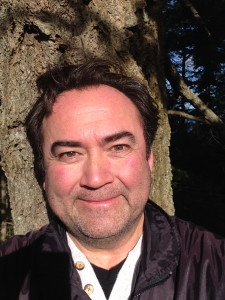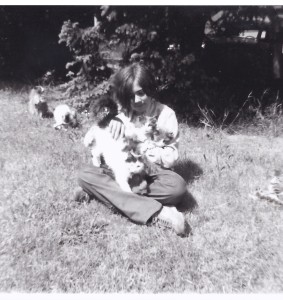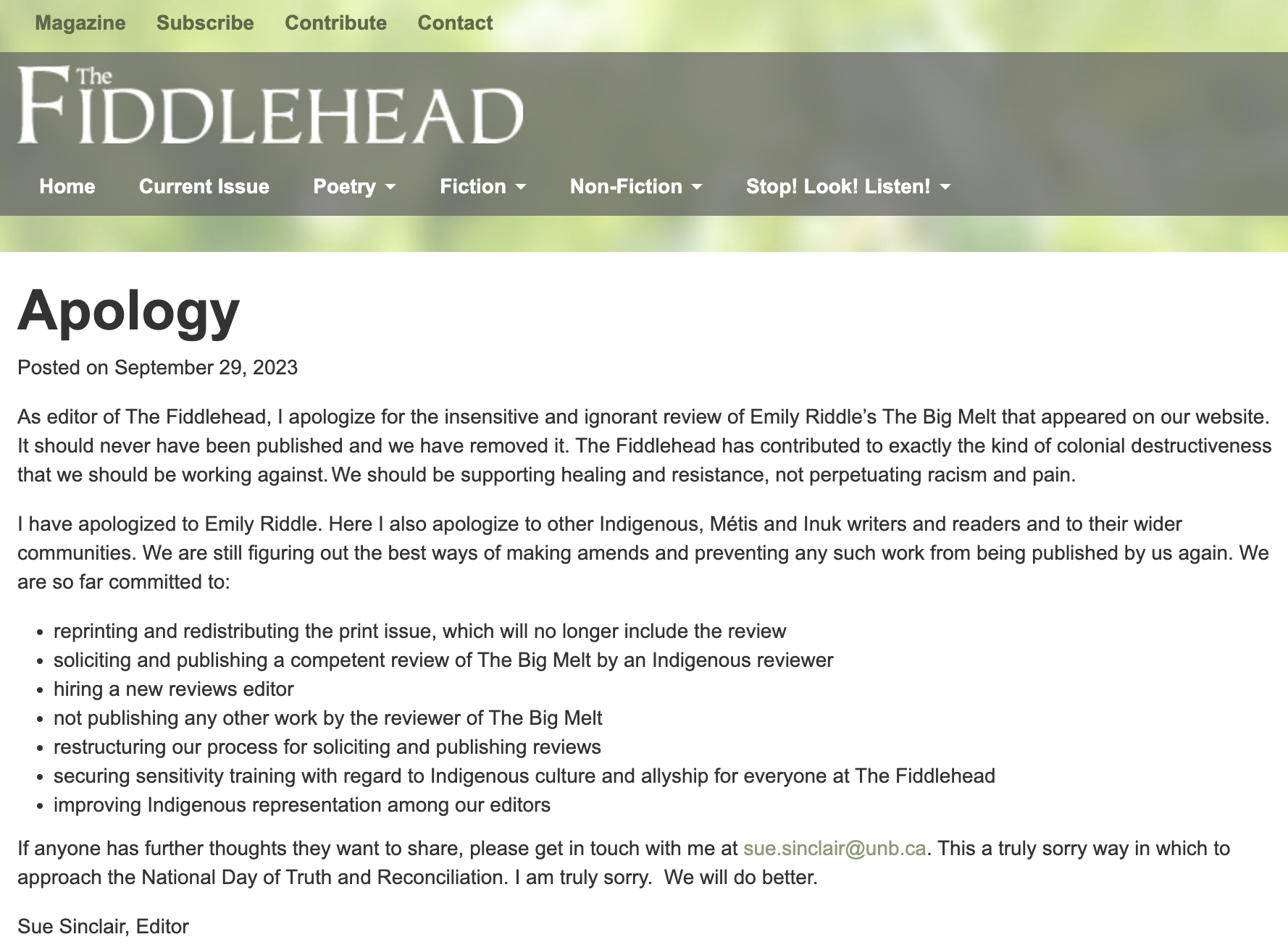 John Aitken is a physical actor, carver, filmmaker, photographer and educator. John’s mixed ancestry includes Coast Salish and Scottish. He self identifies as First Nations.
John Aitken is a physical actor, carver, filmmaker, photographer and educator. John’s mixed ancestry includes Coast Salish and Scottish. He self identifies as First Nations.
OM: On February 20, 2016, I saw your latest performance, The Gift, at the Presentation House Theatre in North Vancouver. It was a smaller matinee crowd, but you had everyone’s attention. Everyone except an old lady in the front row who spoke loudly as if she were sitting in front of her television at home. She only spoke a few words, but it had a jarring effect. How ironic that a piece about not speaking would be interrupted by someone speaking. I was a few rows behind her, and I wasn’t sure if you could hear her on stage. I assumed you could not because you carried on as if nothing had happened. Later, it become clear that both you and Shelley heard the woman and it knocked you both off balance. It’s a testament to your professionalism that you both carried on without any indication that you were affected. How did you keep the show from going off the rails?
JA: After this performance I found out I was projecting this onto my fellow actor. She was not thrown as I was at this woman who was obviously not enjoying the performance. What went through my mind as the co-writer was: “what if this show is ridiculous like the woman called out a couple times?” And, at one point I wanted to tell her to “get out”. It took everything inside of me as a performer to carry on without showing I was affected by this “ridiculous” woman. This will happen in live theatre. As a performer, you carry on.
OM: It seems to me that a quiet, wordless show is a bit of a high-wire act. Without the usual noise, loud speeches, and music that thunders out from the speakers in a regular performance, you are at the mercy of the audience. Every seat adjustment, cough, ringing phone, whisper, and crinkled water bottle will be heard. Any restlessness is going to be audible and obvious. Luckily, audience engagement was high that afternoon and the room was quiet except for our friend in the front row. You mentioned that Friday’s show was electric. Is there anything you can do to ensure a connection with the audience, or is it a coin toss on any given night?
JA: To be absolutely honest, this one performance was the only time which the action of an audience member was noted. All other performances (with gratitude), audiences are quietly connecting/engaging with the performance. This piece is done in a “dream-like” state, the objective is to pull audience members into what is going on on stage. And, having minimal props and only two performers requires full commitment from both performers and we need to ensure that there is always something physically or audibly happening on stage for the full 55 minutes.
OM: In our discussion you mentioned another performer at a different show who had ripped a notebook out of the hands of a reporter who was rustling through his notes in the front row. That seems like a fair reaction to a noisemaker at a live show. Do you think we are so used to the screens in our lives that we have forgotten how to behave in live theatre situations?
JA: I think that on occasion, this type of personality will ‘accidentally’ purchase a ticket and be rude. Most ‘theatre’ people are educated people with a general interest in the arts and supporting the arts and will be open to whatever is occurring in front of them. We have all been in situations where people just insist on talking throughout a theatre piece or movie. Some people are oblivious to their own behaviour or are simply rude people.
OM: I poked around on Wiki looking for a possible name for the condition you had as a child. The DSM-5 code for elective mutism is 313.23. Does that sound like it might be close? Is there any value at this point in classifying the pathology? You mentioned that you just knew it was time to “keep quiet”. Keep quiet to avoid further abuse? Keep quiet to avoid attention?
JA: I did what I needed to do to survive what was happening each day as a child. My childhood trauma was severe enough for me to resort to such drastic measures. For me to feel the need to not speak till I was 17 meant I was experiencing intense abuse.
OM: I must admit that I was not initially enthusiastic about the talking circle following your performance. I was thinking, Oh, hell no! No way, no how! Surprisingly (to me) most stayed for this and participated, bringing out many thoughtful and emotional responses. They jumped on the opportunity to process what they’d just seen, and it seemed much more civilized that just flushing everyone out into the streets after the lights came up. Maybe every performance should be followed by a talking circle. What is the value of this for you and for the audience?
JA: Every performance of The Gift ends with a talking circle. Co-writer, Gail Noonan and I knew at early stages of this production that we needed to include an opportunity for audience members to share their thoughts/feelings after such an intense piece of theatre. The talking circle was a natural choice for me as a First Nations person.
OM: There is a new and heavy emphasis on diversity for the 2017 funding year at the Canada Council. It seems like there has never been a better time to be a Coast Salish performer. What Canada Council grants are available to you? Can you get a grant to take the show across Canada? Has your band been helpful?
JA: I have not yet investigated any other grants available for First Nations people. They (Canada Council) have a brand new model. It is my hope that it will be a combination of grants and private donors which will enable this piece to go across Canada. I am only a Registered Indian, I do not have membership on any band. I’d need to be a band member to apply for funding. I am an urban-Indian (this topic is a messy one, which will require an entire thesis to explain).
OM: You’re an introvert who loves being on stage. You said you were very careful to control and monitor your energy levels and made sure to book a room of your own rather than stay with friends in Vancouver. What else can you do to manage your introvert nature when you’re engaging in extrovert type activities?
JA: I live in a quiet/small community, this enables me to ‘hide’ myself away for long periods of time to recharge my emotional/spiritual self. I spend a lot of time on my own. Most times if I get invited to social gatherings I politely decline.
OM: In the CBC North by Northwest interview, you said you wrote, gestured, signalled, and made faces to communicate when you weren’t speaking. Did you ever laugh? Did you ever hum or whistle? Do you remember your first word?
JA: I recall laughing and whistling as a child. I do not recall my first word but I do recall saying to someone “couch”.
OM: I love the story about the Native social worker who took you down to the beach when you were 18 and gave you an ultimatum: learn to speak or learn to sign. You were about to pass out of Ministry care and she knew that your life was going to be even more difficult if you did not start to communicate. Do you think your worker was exceeding the regular standards of care? Do you think wards of the state are still getting that level of care and attention?
JA: I think this child care worker did go above and beyond her job description, she truly cared for me. I do not think this level of one-to-one care is possible today. Social workers appear to have too many files and not enough time in any day to effectively tend to anyone. Burnout among social workers is high. The Ministry of Children and Families does not appear to have the infrastructure to ensure any individual success. This is a broad statement but their entire structure needs to change. What this looks like, I do not know but their current system does not work.
OM: How did you snag an interview (starts at 25:00) on North by Northwest? Did you approach them? Did they approach you?
JA: I’ve a history with this CBC program (I’ve been on a couple other times). On this occasion, my partner approached them to interview me on this topic but having this history helped I am sure.
OM: How did the ICTV After Hours interview come about?
JA: One of the founders and hosts just happens to live in my community, I mentioned this piece and she asked if I’d be interested in doing an interview. I will be doing a second segment with this show within a month.
OM: Besides interviews, what else can you do to promote yourself? Have you ever considered hiring a PR firm? What other categories of promotion would you consider? Your own website? Direct advertising?
JA: I do have a Facebook page for The Gift, this has been very helpful in getting the word out. I need to create a website for sure (been procrastinating on this). The First Nations theatre community across Canada is small, word of mouth has been very helpful. Also, I have a great mentor, Kim Selody who is the Artistic Director at Presentation House Theatre, he has been instrumental in getting this piece known by the theatre community across Canada.
OM: Did you get a good response from the interviews you have given? Are you a celebrity on Mayne Island now? Did any Mayne folk see your interviews?
JA: The last interview on North by Northwest I received a lot of positive feedback. There were a few people who heard this interview who attended a performance at Presentation House Theatre. The community on Mayne has been incredibly supportive of this production. There were many community members who heard or saw my interviews. I am a small celebrity in my community and this introvert “loves” this!





Leave A Comment